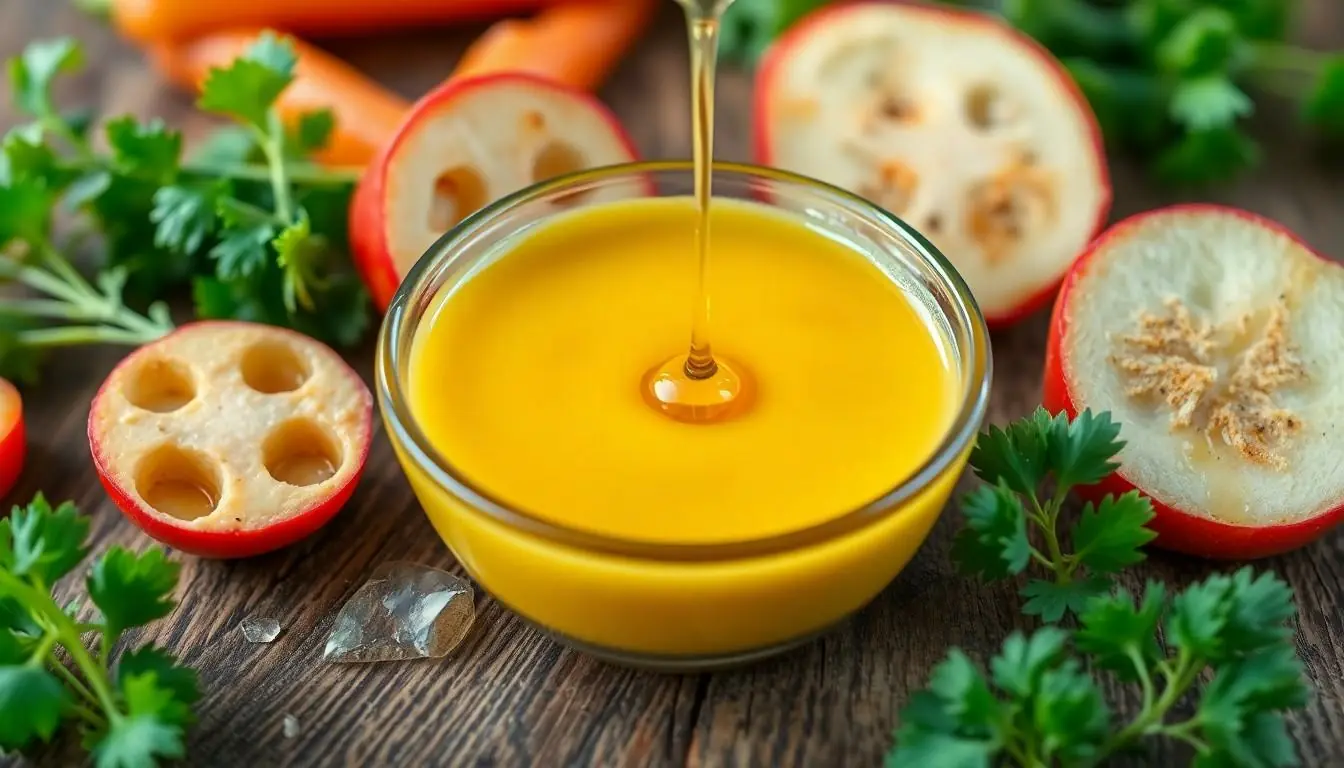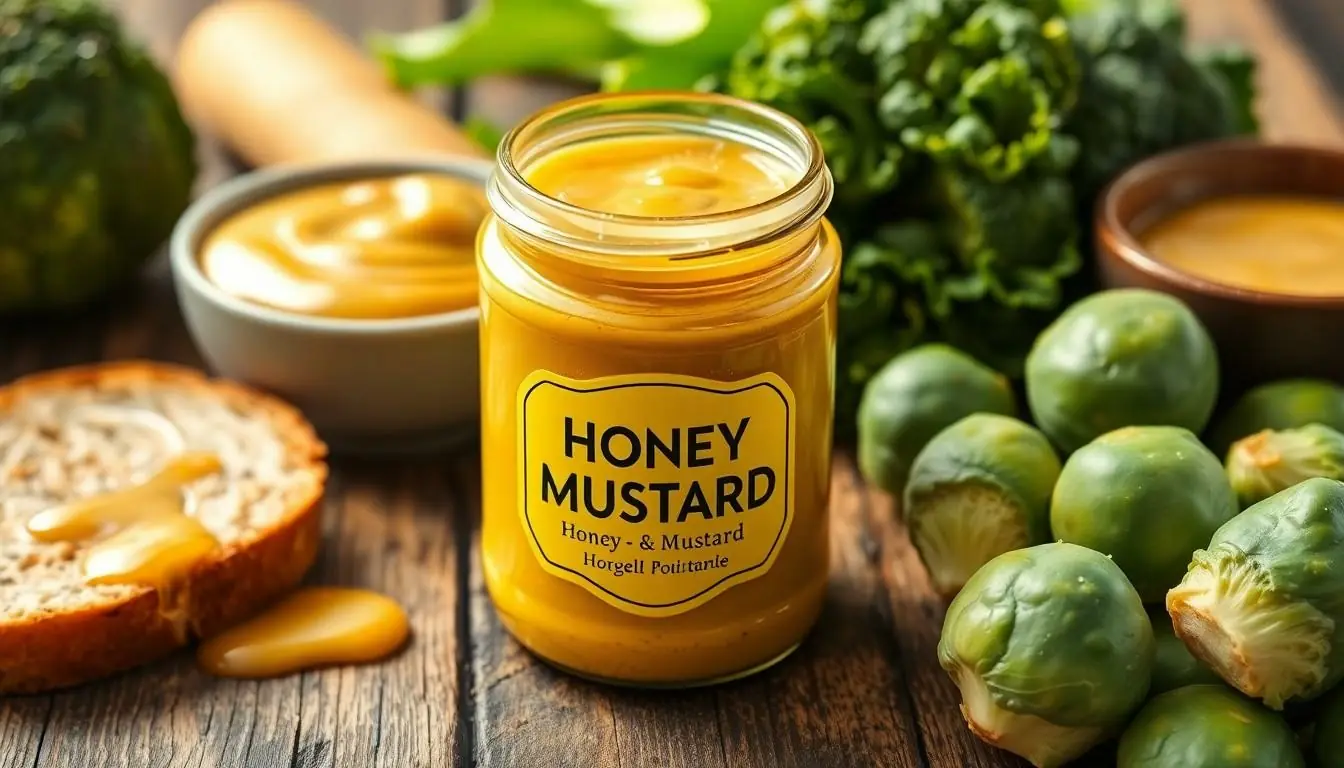Honey mustard is more than just a tasty dip; it’s a flavor-packed powerhouse that can elevate any meal. Whether it’s drizzled over salads or slathered on sandwiches, this sweet and tangy condiment has a way of making everything better. But while it tantalizes taste buds, what about its nutritional profile?
Before diving into the deliciousness, it’s essential to understand what’s lurking behind that golden hue. Is it a friend to your health or just a sneaky imposter? With a mix of honey and mustard, this condiment could be a delightful addition to your diet or a hidden source of sugar. Let’s break down the honey mustard nutrition facts and discover if this condiment is a culinary hero or just a sweet talker.
Table of Contents
ToggleOverview of Honey Mustard
Honey mustard combines the sweetness of honey with the sharpness of mustard, creating a unique flavor profile. This condiment typically contains three main ingredients: honey, mustard, and vinegar. The specific types of honey and mustard used can impact flavor intensity and nutritional content.
Nutritionally, a standard serving of honey mustard, about one tablespoon, contains approximately 30 to 60 calories. It also offers a blend of carbohydrates, primarily from honey, which can include about 5 to 10 grams of sugar. Protein content usually remains low, sitting around 0.2 to 0.5 grams per serving.
Fat content in honey mustard range from 0 to 2 grams, depending on the recipe. It often lacks significant vitamins and minerals, though some varieties might include small amounts of potassium, calcium, or iron. The sugar content raises concerns for those monitoring their intake, as it can contribute to daily totals.
Serving suggestions highlight its versatility. Honey mustard pairs well with salads, grilled meats, and sandwiches, enhancing their flavors. It’s important to check labels for added sugars or preservatives in commercial varieties.
Opting for homemade versions can help control ingredient quality and sugar levels. Recipes can easily customize honey mustard by adjusting honey and mustard ratios. Understanding these aspects helps in determining how honey mustard fits into overall dietary preferences.
Nutritional Composition

Honey mustard contains caloric content and nutritional information that vary based on the recipe. Understanding its macronutrient and micronutrient composition aids in evaluating its health impact.
Macronutrients
A standard serving of honey mustard typically provides 30 to 60 calories. Sugar content generally ranges from 5 to 10 grams per serving, primarily derived from honey. Fat levels are low, varying from 0 to 2 grams depending on the brand or homemade recipe. Protein content is minimal, often less than 1 gram. For those monitoring carbohydrate intake, honey mustard contains 8 to 10 grams of carbohydrates per serving, influenced by the proportion of honey used.
Micronutrients
Honey mustard lacks substantial vitamins and minerals but can offer trace amounts. Some varieties provide small quantities of potassium, calcium, and iron. Each of these micronutrients contributes to overall health but in limited amounts. The exact values will differ based on the ingredients used. Reading labels helps identify specific micronutrient content in commercial products. Homemade versions can enhance nutrient profiles by incorporating additional healthy ingredients.
Health Benefits of Honey Mustard
Honey mustard provides various health benefits that can complement its flavorful profile. Many individuals appreciate its potential nutrient contributions.
Antioxidant Properties
Honey contains antioxidants like flavonoids and phenolic acids. These compounds protect cells from oxidative stress. Mustard seeds also contribute antioxidants that may reduce the risk of chronic diseases. A blend of honey and mustard in honey mustard enhances overall antioxidant capacity. This combination can help combat free radicals in the body, promoting better health. Research supports that antioxidants play a crucial role in neutralizing harmful molecules, contributing to a balanced diet.
Anti-Inflammatory Effects
Honey mustard may offer anti-inflammatory effects due to its natural ingredients. Honey has demonstrated anti-inflammatory properties in various studies. Mustard contains compounds such as sinigrin, which may also help reduce inflammation. Integrating honey mustard into meals can support overall health. Individuals seeking to manage inflammation may find this condiment beneficial. It’s important to consider that incorporating honey mustard into a balanced diet can provide additional anti-inflammatory support.
Culinary Uses of Honey Mustard
Honey mustard serves as a versatile condiment in various culinary applications. Frequently, people incorporate it into salad dressings, enhancing flavors with a sweet and tangy profile. Sandwiches often come alive with a spread of honey mustard, providing a zesty alternative to traditional condiments.
Dipping sauces benefit from honey mustard’s unique taste, making it a popular choice for chicken tenders, pretzels, or vegetables. Glazing meats, such as chicken or pork, using honey mustard creates a delectable caramelized coating during cooking. Marinades also gain depth when honey mustard is mixed with herbs and spices, imparting enhanced flavor to grilled or roasted dishes.
In baking, honey mustard’s sweet and tangy notes can elevate recipes, especially in breads and pretzels. Pairing honey mustard with different cheeses offers a delightful contrast on cheese platters. It’s common to find honey mustard included in charcuterie boards, where its balance complements various cured meats.
Broccoli and Brussels sprouts sometimes receive a honey mustard drizzle, turning vegetables into an appealing side dish. Additionally, honey mustard may work well in pasta salads, providing a creamy texture when blended with yogurt or mayonnaise.
A unique twist emerges when used in sushi rolls, adding a refreshing flavor to seafood options. Cooking with honey mustard inspires exploration, encouraging culinary creativity in multiple dishes.
Honey mustard stands out as a versatile condiment that not only enhances flavors but also offers some health benefits. While its calorie count is relatively low, the sugar content primarily from honey warrants attention, especially for those monitoring their sugar intake.
Choosing homemade versions can provide better control over ingredients and sugar levels. Additionally, the antioxidant properties found in both honey and mustard seeds may contribute positively to overall health.
Ultimately, incorporating honey mustard into a balanced diet can be enjoyable and nutritious when consumed mindfully.




